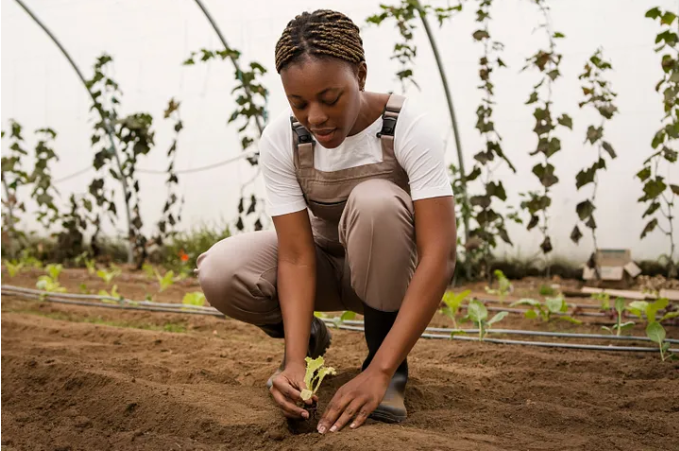
NIGERIA AGRICULTURAL SYSTEM AND SECURITY.
Written based on team’s member personal experience
“Nigerian farmers and agronomists have expressed concern that widespread insecurity and higher prices of farm inputs in the country are shrinking the number of hectares put to food cultivation and this will affect the productivity of farmers in the 2022/2023 wet season.” This was published by the Guardian newspaper on the issue of insecurity and farming in Nigeria on the 2nd of August, 2022. “The recent increase in kidnapping and banditry had made a lot of farmers run from their farmlands in search of safe hideouts” published by Premium Times Nigeria on the 14th of May, 2021. “Average spending on security measures costs N1m per farm, As kidnapping for ransoms and killing of farmers escalate countrywide, high cost of ensuring security of life and property on most farms has pushed up cost of production and food inflation in the country amid other production constraints.” Published by The Guardian newspaper on the 6th of May, 2021.

Image credit: www.freepik.com
With these publications, it is a fact that insecurity on the farm did not just start, it has started for more than a year and solutions have not been proffered by any tiers and level of government in Nigeria. This technically means that some lives have been lost, some crops have been damaged, some farmers have been injured and displaced, some communities have been economically handicapped due to the cases of insecurity in one community or the other. Rural farmers are the major producers of food for Nigeria and they are the major ones being attacked by the effect of insecurity in the country. Imagine, 70% of Nigeria rural farmers are displaced from their farm community, what will be the outcome of food production in Nigeria?
Nigeria has 70.8 million hectares of agriculture land area with maize, cassava, guinea corn, yam beans, millet and rice being the major crops and according to Statista, the country is a leader in various types of agricultural production, such as palm oil, cocoa beans, pineapple, and sorghum. It is the largest producer of sorghum in the world just after the United States, and ranks fifth in the production of palm oil and cocoa beans. How do we keep going up the radar and not falling down the radar with the effect of insecurity on farmers and farmlands in Nigeria? How do we put a stop to the insecurity farmers experience on their farm and community?
Personally, I have experienced farm insecurity and I will share the story with you. I was consulting for a farm and after being successful at a branch, the owner decided to purchase another large expense of land which was way bigger than the first one and as a consultant I was so happy and elated, we started cashew production, we cleared, applied some agricultural production tactics that will put a stop to weeds for a couple of months so as to ensure the bountiful growth of the cashew. After some months the cashew has grown to a certain level and we were happy about the progress and decided to intercrop it with some crop so as to be able to gather more profit the following week. To our surprise, we got to the farm the following week and all the cashew was completely burnt which was done by some set of cattle herders that we could not even approach. We moved forward and I will be sharing what helped us.
Image credit: www.freepik.com
With these publications, it is a fact that insecurity on the farm did not just start, it has started for more than a year and solutions have not been proffered by any tiers and level of government in Nigeria. This technically means that some lives have been lost, some crops have been damaged, some farmers have been injured and displaced, some communities have been economically handicapped due to the cases of insecurity in one community or the other. Rural farmers are the major producers of food for Nigeria and they are the major ones being attacked by the effect of insecurity in the country. Imagine, 70% of Nigeria rural farmers are displaced from their farm community, what will be the outcome of food production in Nigeria?
Nigeria has 70.8 million hectares of agriculture land area with maize, cassava, guinea corn, yam beans, millet and rice being the major crops and according to Statista, the country is a leader in various types of agricultural production, such as palm oil, cocoa beans, pineapple, and sorghum. It is the largest producer of sorghum in the world just after the United States, and ranks fifth in the production of palm oil and cocoa beans. How do we keep going up the radar and not falling down the radar with the effect of insecurity on farmers and farmlands in Nigeria? How do we put a stop to the insecurity farmers experience on their farm and community?
Personally, I have experienced farm insecurity and I will share the story with you. I was consulting for a farm and after being successful at a branch, the owner decided to purchase another large expense of land which was way bigger than the first one and as a consultant I was so happy and elated, we started cashew production, we cleared, applied some agricultural production tactics that will put a stop to weeds for a couple of months so as to ensure the bountiful growth of the cashew. After some months the cashew has grown to a certain level and we were happy about the progress and decided to intercrop it with some crop so as to be able to gather more profit the following week. To our surprise, we got to the farm the following week and all the cashew was completely burnt which was done by some set of cattle herders that we could not even approach. We moved forward and I will be sharing what helped us.
Image credit: www.freepik.com
With these publications, it is a fact that insecurity on the farm did not just start, it has started for more than a year and solutions have not been proffered by any tiers and level of government in Nigeria. This technically means that some lives have been lost, some crops have been damaged, some farmers have been injured and displaced, some communities have been economically handicapped due to the cases of insecurity in one community or the other. Rural farmers are the major producers of food for Nigeria and they are the major ones being attacked by the effect of insecurity in the country. Imagine, 70% of Nigeria rural farmers are displaced from their farm community, what will be the outcome of food production in Nigeria?
Nigeria has 70.8 million hectares of agriculture land area with maize, cassava, guinea corn, yam beans, millet and rice being the major crops and according to Statista, the country is a leader in various types of agricultural production, such as palm oil, cocoa beans, pineapple, and sorghum. It is the largest producer of sorghum in the world just after the United States, and ranks fifth in the production of palm oil and cocoa beans. How do we keep going up the radar and not falling down the radar with the effect of insecurity on farmers and farmlands in Nigeria? How do we put a stop to the insecurity farmers experience on their farm and community?
Personally, I have experienced farm insecurity and I will share the story with you. I was consulting for a farm and after being successful at a branch, the owner decided to purchase another large expense of land which was way bigger than the first one and as a consultant I was so happy and elated, we started cashew production, we cleared, applied some agricultural production tactics that will put a stop to weeds for a couple of months so as to ensure the bountiful growth of the cashew. After some months the cashew has grown to a certain level and we were happy about the progress and decided to intercrop it with some crop so as to be able to gather more profit the following week. To our surprise, we got to the farm the following week and all the cashew was completely burnt which was done by some set of cattle herders that we could not even approach. We moved forward and I will be sharing what helped us.

Image credit: www.freepik.com
The installation of CCTV; This is full named Closed-Circuit Television and it also known as video surveillance, this is the use of video cameras to transmit a signal to a specific place, on a limited set of monitors. It differs from broadcast television in that the signal is not openly transmitted, though it may employ point-to-point (P2P), point-to-multipoint (P2MP), or mesh wired or wireless links. Even though almost all video cameras fit this definition, the term is most often applied to those used for surveillance in areas that require additional security or ongoing monitoring. CCTV is intended to aid in the prevention and detection of crime. It can reassure the residents about the safety of the community. It is placed in public places to provide evidence to appropriate law enforcement agencies.
Urban and rural farmers often shy away from the installation of CCTV cameras and depend mostly on their religious beliefs which in many times have not helped the situation. The cost of CCTV installation seems to be the major reason an average farmer shies away from the use of CCTV to control insecurity from their farm among many other reasons like lack of technical know-how, ignorance, high level of illiteracy and farther farm locations. An average farmers should be informed that installing CCTV cameras on their farm property will serve as a strong deterrence to criminals and those engaging in unlawful activities. The presence of a CCTV camera conveys a sense of danger and the presence of the law, discouraging anyone trying to commit a crime on the farm.

Image credit: www.freepik.com
The presence of trained dogs: Kalita! Kalita! Kalita! My farmer friend shouted as I was almost panting out my life, struggling with inhaling my breathe while running like a junior Tobi Amusan. What just happened? My farmer friend’s dog named Kalita just stopped running after me on his Cocoa Farm being the first time I went to his farm alone. After Kalita turned back, I was sure that this my friend’s farm is not the one to visit when he is not there. I have a lot of older farmer friend in different farm communities and majority of them have dogs and these dogs have different name. Once they notice a stranger, they pick race, sometimes to just scare you away or to sniff your smell and have your smell stored in their memory.
Can farmers normalize having trained dogs on their farms? An average citizen will most likely fear a domesticated dog not to compare with a trained dog that can sense the presence of a stranger on a farm. Farmers should be aware that not only their house deserves a dog, your farm deserves a well trained dog too, get one today.

Image credit: www.freepik.com
Fencing: Even backyard farms should have a fence, don’t make the mistake of starting a commercial farm and leaving out a fence. Fencing is used to keep animals in or out of a specific region. A farm fence is one that is built to hold cattle, enclose crops, water areas (except private swimming pools), woodlots, structures, fields, or laneways for agricultural purposes. Depending on the terrain, location, and animals to be contained, they can be fashioned with a wide range of materials. Most agricultural fencing is roughly 4 feet (1.2 m) high, and in some regions, the height and construction of livestock fences is required by law. There are different fencing types and they include wired fence, barbed wire and many more.
In conclusion, Nigeria’s agricultural system is critical to the country’s economy and the well-being of its people. However, the sector faces significant challenges such as insecurity and insufficient investment, which negatively impact its growth and development. Our Twitter space recording on Nigeria’s agricultural system and security highlights the importance of addressing these challenges to improve the sector’s efficiency and resilience.
Find the Twitter space recording here
https://twitter.com/i/spaces/1yoJMZMrbjlxQ
It is crucial for stakeholders to collaborate and implement policies that promote agricultural innovation, investment, and security to achieve sustainable food production and economic growth. With the right measures in place, Nigeria’s agricultural system has the potential to thrive, providing food security and economic opportunities for millions of Nigerians.



